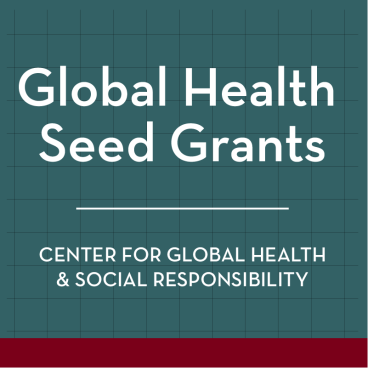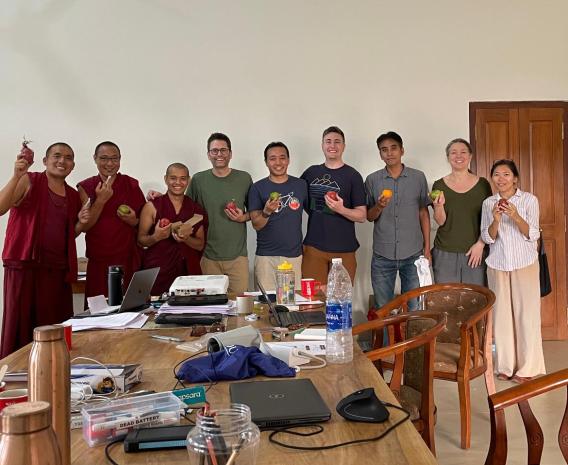Seeds of Change
Kigali, Rwanda, has been the site of Seed Grant-funded research by Jennifer Rickard and her team.
Global health research is at the core of sustainable solutions, but it can be difficult for junior researchers to find funding to get their research off the ground. A small amount of funding can be a catalyst for change—and the Center for Global Health and Social Responsibility (CGHSR) Global Health Seed Grants aim to do just that.
Since 2016, the $25,000-grants have supported 35 research projects. The funding has allowed University of Minnesota (UMN) faculty to partner with local experts and delve into issues that have focused on everything from mental health to viral infections in chemotherapy patients.

CGHSR is currently accepting applications for 2023 Seed Grant proposals. This year, in addition to the annual CGHSR global health grants, there is a special interest call for research projects specifically pertaining to women's health.
Whatever the project is, three things are vital: The project must be research-focused, align with CGHSR values, and include a co-partner in the host country that also agrees that the proposal is a priority in their community.
“A faculty member may have been collaborating with someone overseas on a project idea that is small enough in scope that this amount of money can be very helpful for their initial research,” said Darlisha Williams, MPH, the CGHSR Project Coordinator who manages Seed Grants. “Our hope is that in the future, the initial research project will grow into a larger project, too.”
It’s also a way for students in the host country to gain research experience. When this first phase of research is complete, the researchers can use the data these smaller studies yield to apply for larger grants to expand their work.
Collaboration is Key
In 2019, Richard MacLehose, PhD, a professor in the UMN School of Public Health Division of Epidemiology & Community Health, was the recipient of a Seed Grant that he and a bisectional team of researchers would use to study the prevalence of Alzheimer’s disease and related dementias (ADRD) and cognitive practices among Tibetan Buddhist monks in Southern India.
“There is no cure for Alzheimer’s or dementia, so the best option is to delay onset or prevent getting it altogether,” he said.
Dr. MacLehose partnered with a Tibetan medical doctor and anthropologist who had just completed his PhD in the U.S. for the project. Tenzin Namdul, TMD, PhD, had lived at the monasteries that were the setting for the Seed Grant research. He was integral to the success of the study. First, they developed culturally appropriate screening questions to ask the Tibetan Buddhist monks.

“A lot of the questions that are used in the United States don’t apply to them and we needed to be sure we were asking questions in a way that actually made sense,” said Dr. MacLehose.
Together, the two researchers directly collaborated with the monks themselves. They trained a group of younger monks who were interested in scientific research to conduct interviews for the study. Each morning, these monks set out with iPads and interviewed the older monks the team was interested in screening for signs of cognitive decline.
The team collected survey data from over 200 monks and also collected MRIs, genetic information, and urine samples. “Collaborating with the monks and staff at the monastery was integral to the research and led to a trusting partnership that we're planning to continue with future work,” Dr. MacLehose said.
Scalable Solutions
Jennifer Rickard, MD, MPH, FACS, FCS (ECSA) an acute care surgeon at UMN Medical School, received a Seed Grant in 2020, after she had already been working as a surgeon in Rwanda for a decade.
She was interested in antimicrobial resistance (AMR) in surgical site infections. While post-surgical infections are a concern anywhere in the world, low- and middle-income countries face the extra hurdle of having limited options for antibiotics.
“In the U.S. I can pretty much order any antibiotic in the world. In Rwanda, I have about 10 antibiotics at my disposal and it also depends on what is available in the pharmacy on any given day,” said Dr. Rickard, adding that most of her patients get the same two antibiotics.
The infections Dr. Rickard and her colleagues routinely saw were caused by bacteria that originate typically in the gut, such as E.coli. Usually, the two antibiotics could treat these infections, however, an enzyme called extended-spectrum beta-lactamase (ESBL) was causing bacteria to resist antibiotics. These organisms can share the resistance gene with other bacteria.
The study collected samples from 120 post-surgical patients who were monitored for infection. The team is still analyzing the data, which will tell them whether or not people are arriving at the hospital with ESBL already on their bodies, and whether colonization with ESBL is actually causing infections in surgical patients. If so, the data will let hospital staff know they need to push for other options.
“It has been great for someone like me who is early in my career to have that degree of support through the Seed Grant to be able to do research like this,” Dr. Rickard said.
